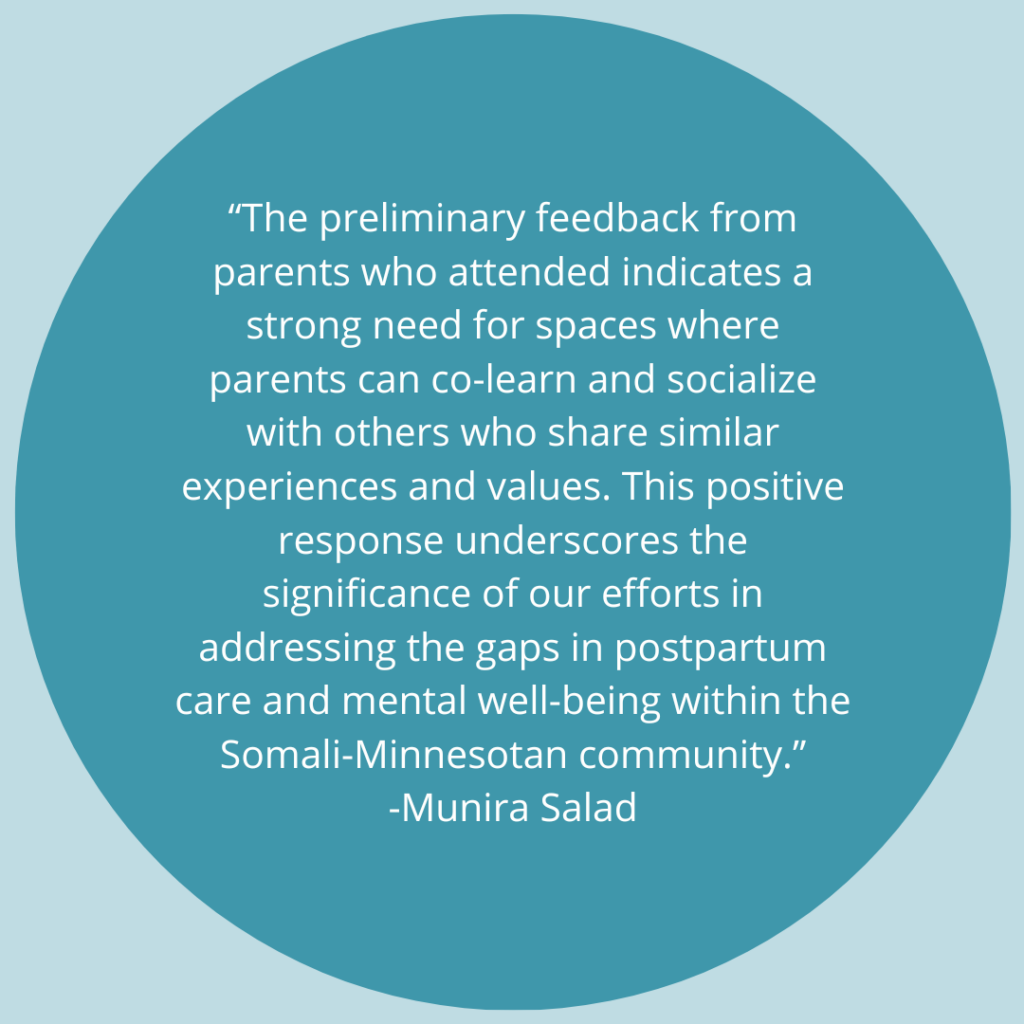#UMNMCH student, Munira Salad (MPH 2024), describes how her passion for community health and engagement introduced her to community-based participatory research (CBPR) approaches and deepened her interest in programs focused on underserved communities. In this Student Spotlight, Munira describes her deployment with the 40-Day Project, which aims to improve postpartum mental well-being in the Somali-Minnesotan community. As a part of her deployment, Munira led focus groups that informed the development and implementation of the curriculum and programming, which was positively received by the families involved, and she hopes to continue with similar work as a public health professional.
40-Day Project Deployment
The 40-Day Project is a collaborative partnership involving the UMN Extension, the Minnesota Association for Children’s Mental Health (MACMH), and the Center for Leadership Education in Maternal and Child Public Health. This initiative focuses on addressing crucial aspects of maternal health within the Somali-Minnesotan community by promoting mental well-being and self-care during the prenatal and postpartum period. Recognizing a gap in postpartum care in the U.S., the project draws insights from Somali practices, particularly the tradition of aftartan-bax, or the 40-day postpartum period of care and support. In Somalia, new moms traditionally receive special care, attention, and foods to promote healing and wellness during this period. These supports may be absent in the U.S., creating a gap that the 40-Day Project aims to fill by fostering a holistic and supportive environment through resource sharing and creating spaces where parents can gather to connect with each other and learn to navigate parenthood.
My Contributions and Accomplishments
Since joining the 40-Day Project last summer, I have actively contributed to shaping and expanding the project’s reach. A significant aspect of my involvement early on was conducting focus groups with healthcare and community providers, as well as parents, to gain insight into how the project can be expanded beyond its current web-based model, which delivers content and resources primarily through the project website.
As the facilitator of these focus groups, I had the opportunity to hear from a variety of perspectives that provided valuable feedback for the project’s expansion. Engaging with healthcare professionals, community providers, and parents has been crucial in understanding maternal health nuances within the Somali-Minnesotan community.
Another significant accomplishment is my contribution to developing the postpartum mental well-being curriculum. Collaborating closely with my APEX preceptor, Cari Michaels, I co-developed a curriculum that was created from web-based content. This transitioned the material from online resources to a tangible tool for facilitating support groups for parents. We launched a 5-week, hybrid support group during this past winter break following the curriculum implementation, which was well attended. Our team is proud of convening this first group as this is a key achievement in meeting one of the project’s long-term goals of promoting mental well-being and self-care to new parents during the initial five weeks of the postpartum period. The preliminary feedback from parents who attended indicates a strong need for spaces where parents can co-learn and socialize with others who share similar experiences and values. This positive response underscores the significance of our efforts in addressing the gaps in postpartum care and mental well-being within the Somali-Minnesotan community.
Next Phase of the Project
In the upcoming weeks, we plan to conduct an assessment of the impact of our support group series. We hope to use this information to further refine the project’s approach, ensuring that the content in the curriculum meets the needs of the community. We also plan to use the data to identify potential areas of improvement and adapt the project’s efforts to better serve the community.
Deployment Reflection
My deployment to the 40-Day Project has deepened my commitment to program development and implementation in Minnesota communities. This experience has highlighted for me the importance of community engagement in maternal health interventions. It has also further reinforced my belief that the most effective programs are those that involve the community in all aspects of development and implementation, highlighting the importance of collaborating with local community partners to create meaningful change.
BIO
Munira Salad is a full-time third-year MCH MPH student. She earned her BSfrom Minnesota State University, Mankato.
Interested in learning more about getting a degree in MCH? Visit our MCH Program page for more information.
#UMNMCH #UMNproud #UMNdriven
![Recognizing a gap in postpartum care in the U.S., the [40-Day Project] draws insights from Somali cultural practices, particularly the tradition of aftartan-bax, or the 40-day postpartum period of care and support. -Quote by Munira Salad](https://mch.umn.edu/wp-content/uploads/2024/02/SS-Munira-Salad-2-1024x1024.png)
